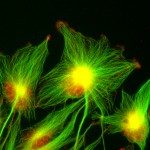Lien vers Pubmed [PMID] – 22275437
J. Cell. Sci. 2012 Feb;125(Pt 4):844-57
Perturbation of cell polarity is a hallmark of cancer cells. In carcinomas, loss of epithelial E-cadherin contributes to the loss of cell polarity and promotes epithelial-mesenchymal transition and carcinoma infiltration. However, the contribution of classical cadherins to the development of non-epithelial tumours is less well documented. We investigated the impact of the level of N-cadherin expression on the polarity and migration of normal and tumour glial cells. Low levels of N-cadherin were frequently observed in human glioma samples and purified glioma cells. Using a wound-healing assay, we show that a decreased level of N-cadherin promotes a faster and less-directed migration both in normal and tumour cells. N-cadherin-mediated contacts control cell velocity and polarity through the regulation of focal adhesions. In cells expressing low levels of N-cadherin, small focal adhesions are present at the entire cell periphery of confluent cells and are not affected by wounding of the cell monolayer. Under these conditions, wound-induced integrin-mediated recruitment of the small GTPase Cdc42, activation of the Cdc42-mediated polarity pathway and centrosome reorientation do not occur. Re-expression of N-cadherin in gliomas restores cell polarity and strongly reduces cell velocity, suggesting that loss of N-cadherin could contribute to the invasive capacity of tumour astrocytes.

